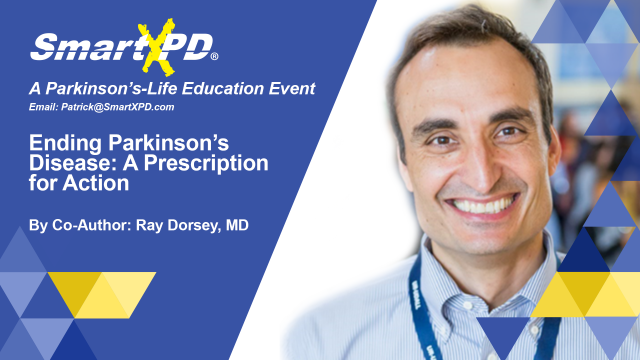Parkinson’s – Discussion Group and Education Series
July 13, 2022
Presented by Ray Dorsey, MD
Dr. Dorsey is a neurologist with a specialization in movement disorders. He directs the Center for HEalth and Technology (CHET) at the University of Rochester. The center’s purpose is to develop ways to offer care to anyone everywhere. In his book, Ending Parkinson’s Disease, A Prescription for Action he talks about environmental factors and their impact on Parkinson’s Disease, advocacy and what people can do to help end Parkinson’s. He references his book frequently throughout the presentation.
This presentation has been recorded and will be available on the SmartXPD YouTube Channel for everyone to access. These are the topics the speaker shared with the group.
The Beginning
Dr. Dorsey gives a brief history of Parkinson’s. In 1817, Dr. James Parkinson identified the condition and his booklet “An Essay on the Shaking Palsy” remans the seminal work on Parkinson’s Disease. The discovery that dopamine could help ease the symptoms of Parkinson’s was another major point in time.
The Phenomenal Growth
The world’s neurological disorders are the leading cause of disability and the fasting growing one is Parkinson’s Disease (PD) (nope – not Alzheimer’s). Dr. Dorsey shares some scary statistics: from 1990 to 2015, the number of people with Parkinson’s (PWP) had grown from 2.6m to 6.3m, more than double. And it is expected to increase to 12.9m by 2040, again more than doubling.
A Link to the Environment
As more research was conducted, several studies supported the theory that environmental factors play a significant role in the risk of developing PD. There is a wide-spread belief that pesticides, herbicides, insecticides, and solvents are in that category. DDT, Agent Orange, TCE, Paraquat, and many other chemicals increase the risk of developing PD.
Advocacy
Dr. Dorsey led a general discussion about advocacy and how important it is, particularly for people with PD. Some of the large national organizations associated with aids, cancer, and multiple sclerosis, have been advocating for their cause for many years, which means they have a lot more money to do research and provide support than PD organizations. There is a need for more front-line advocates.
The PACT
Preventing ban pesticides, clean up toxic sites, protect ourselves, head trauma, diet, and exercise
Advocating take charge, take action, contact local officials
Caring recognize the toll, help those that need it
Treating new treatments, increased research, better technology
Q & A
Stem cell research
Genetics






